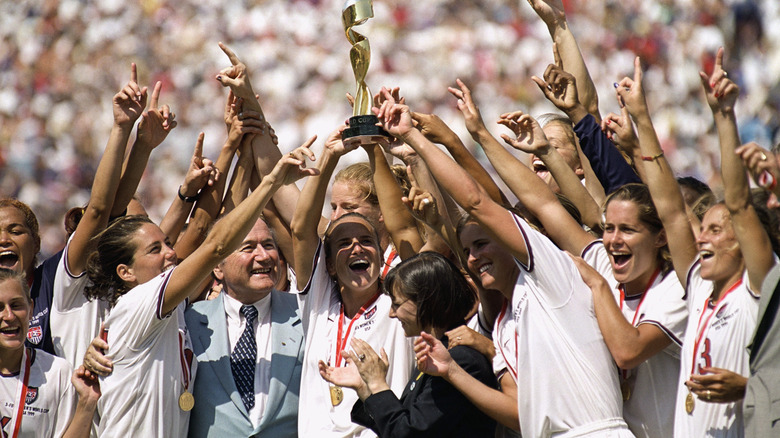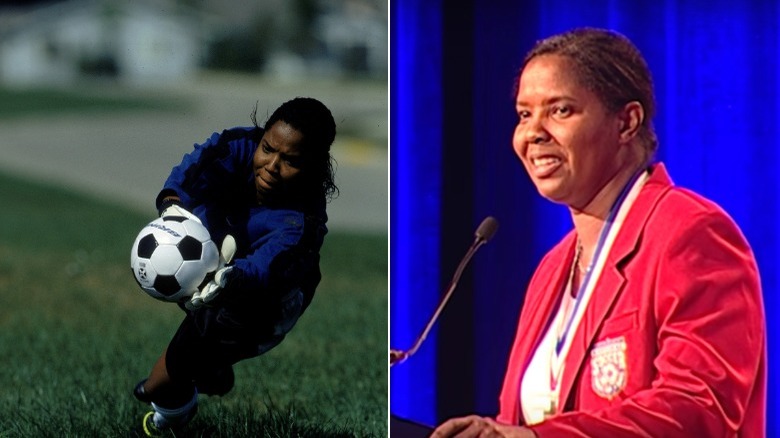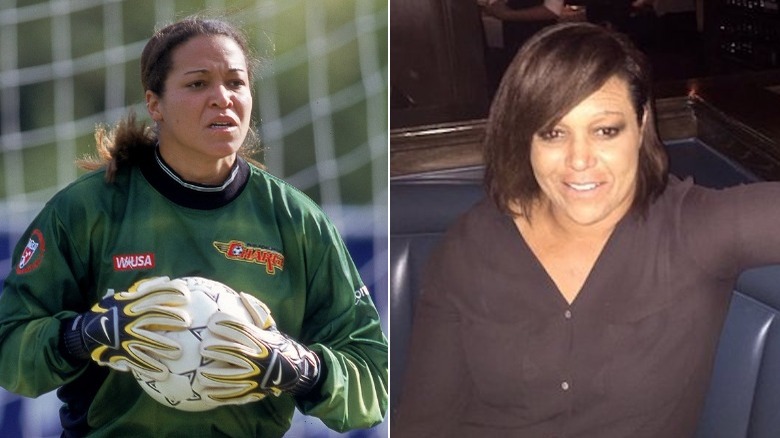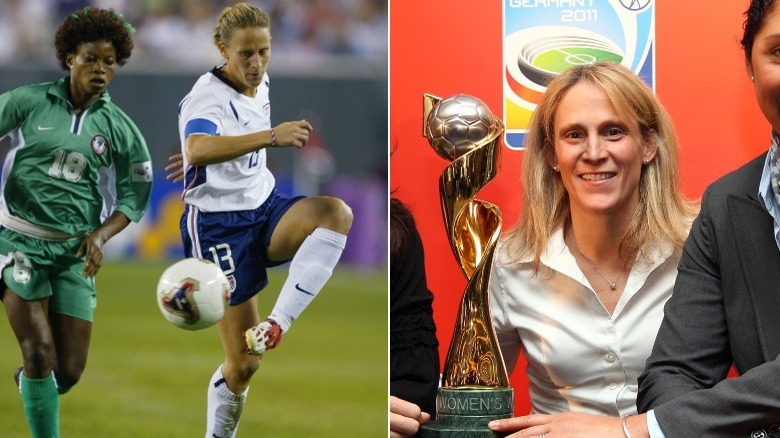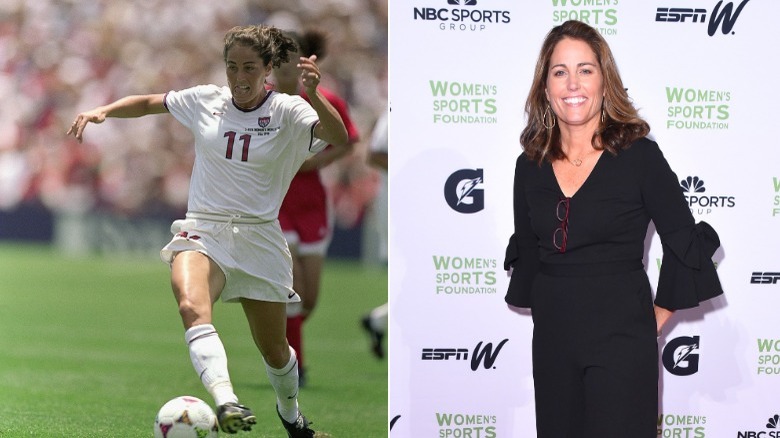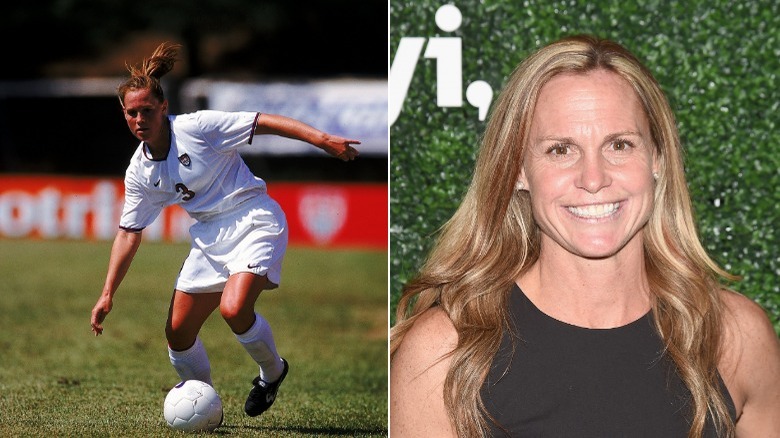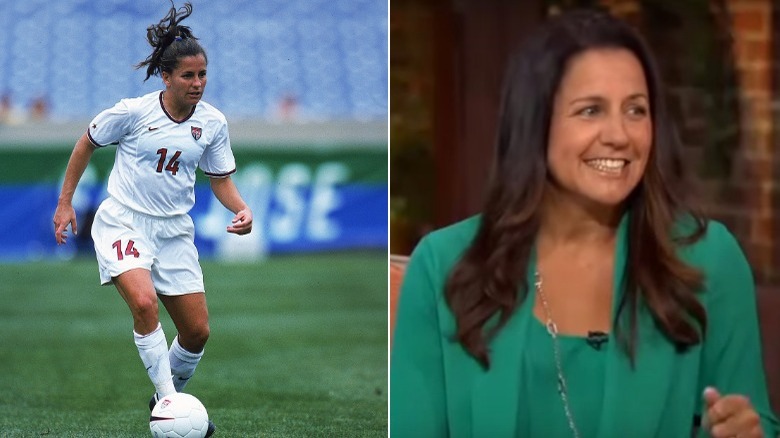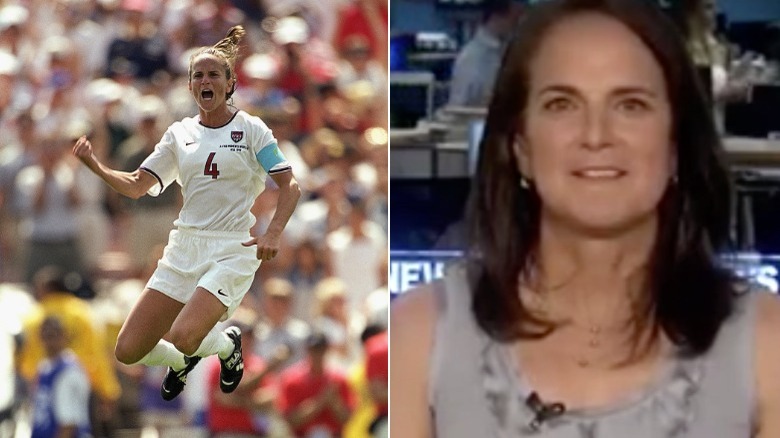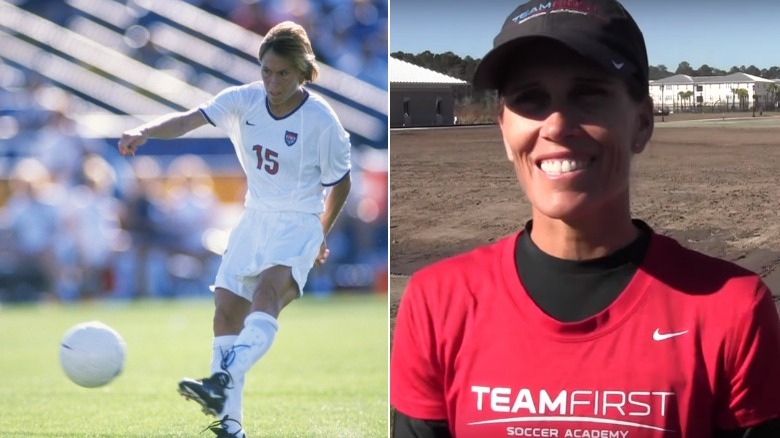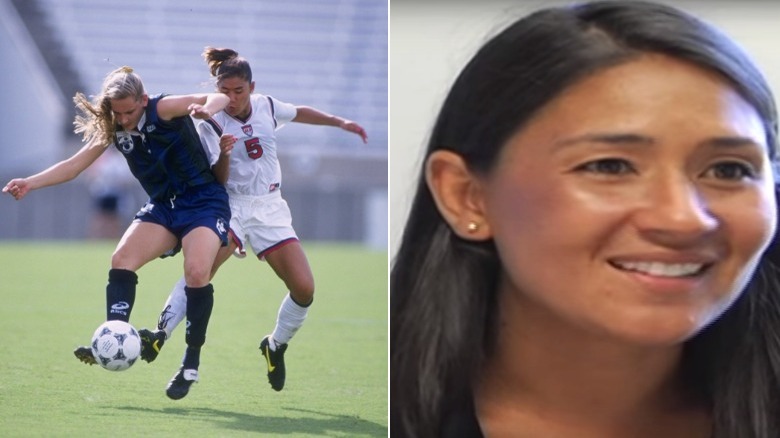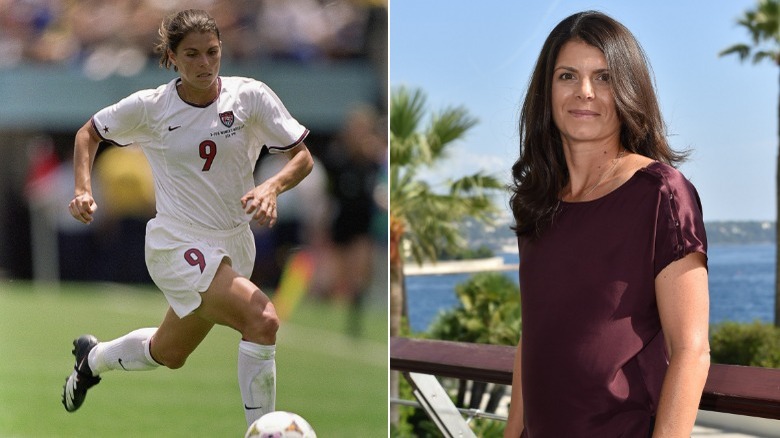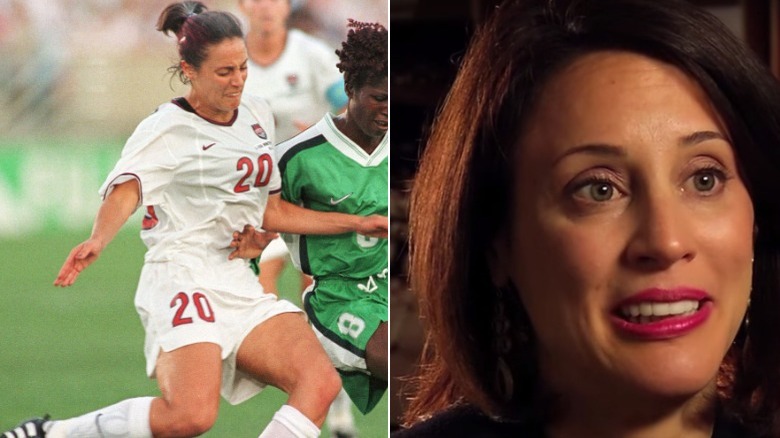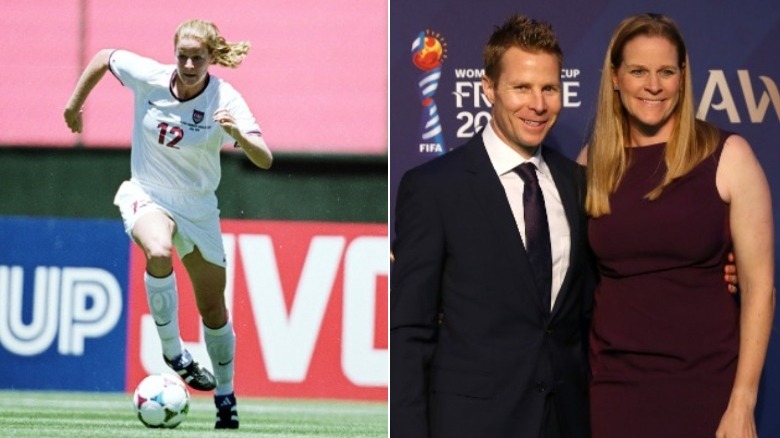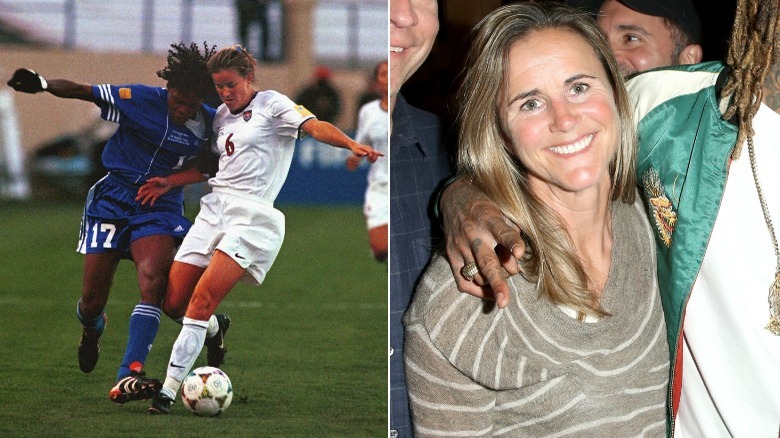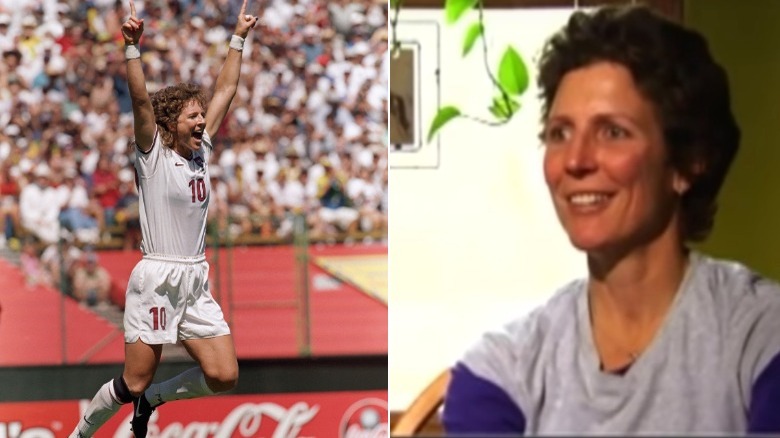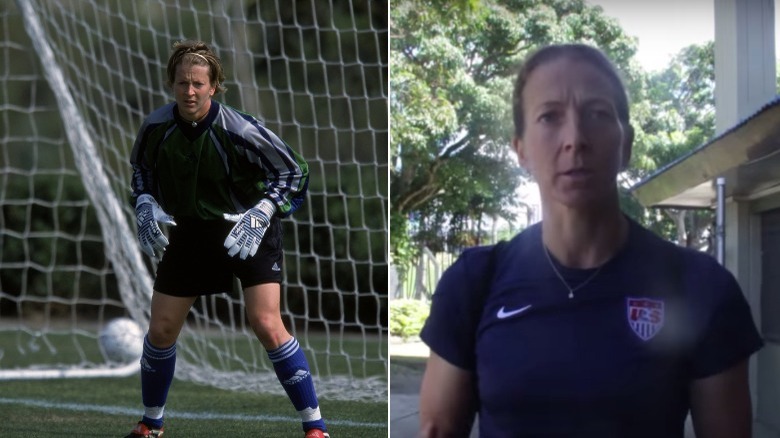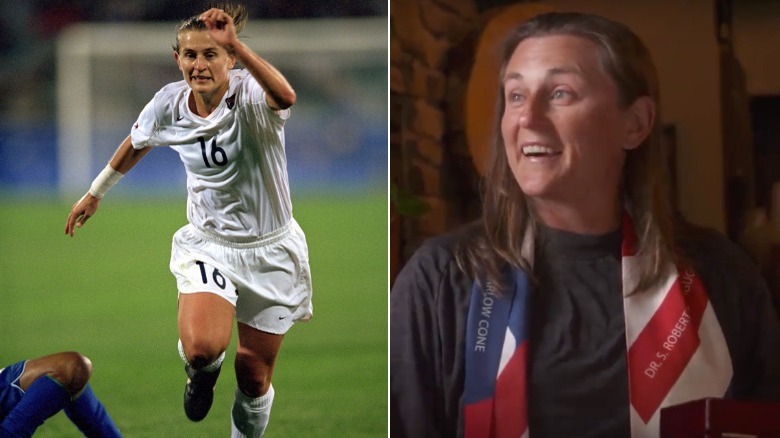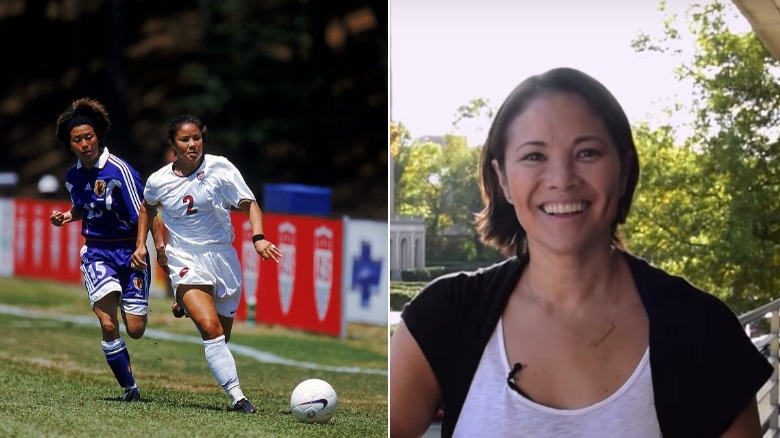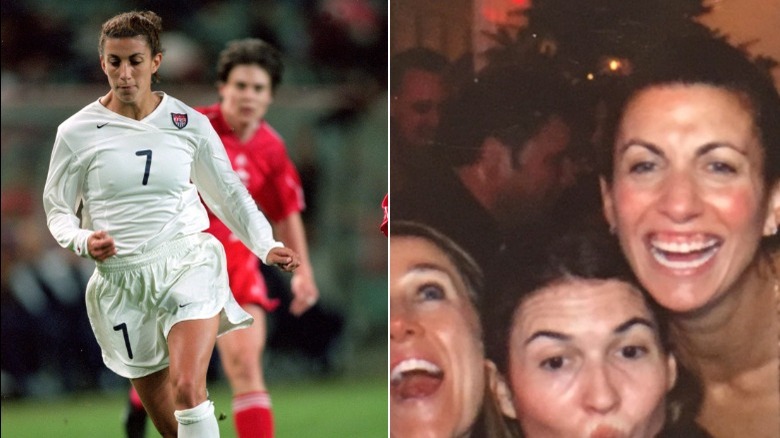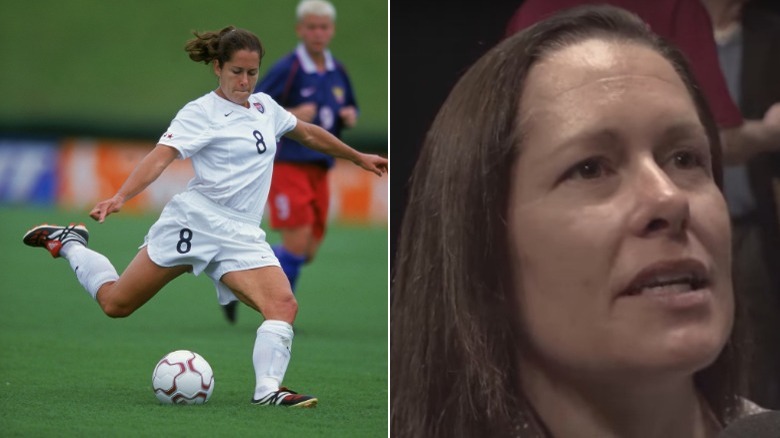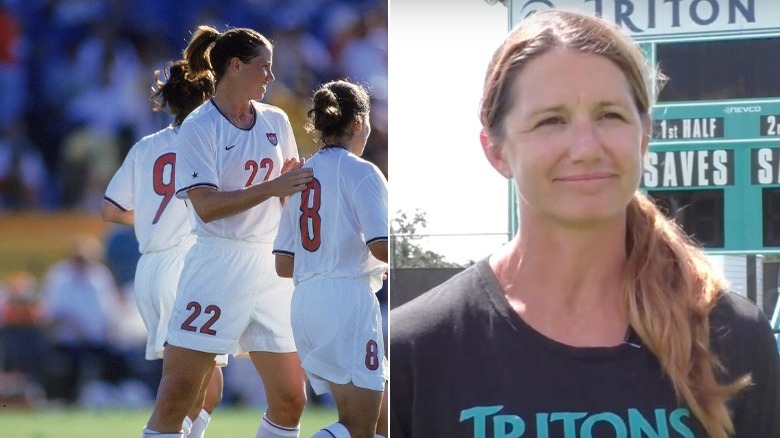What The 1999 USA Women's World Cup Soccer Team Looks Like Now
For girls who grew up playing soccer in the 1990s, the 1999 Women's World Cup was a pivotal moment. If you're a former soccer player of a certain age, the process of watching as the championship game between the U.S. Women's National Team (USNWT) and China turned into a shoot-out — then waiting with baited breath as Briana Scurry made amazing saves, and immediately erupting into celebration when Brandi Chastain made the game-winning goal — is seared into your memory.
In the wake of the 1999 victory, more and more girls became interested in playing soccer, both within the United States and internationally; in fact, according to U.S. Youth Soccer (via Forbes), girls' participation in high school soccer increased 45 percent from 1999 to 2014. It'll be 20 years in the summer of 2019 since that momentous victory (where has time gone?), and we've got the scoop on where the 1999 USWNT, known as the '99ers, are now.
Briana Scurry
Briana Scurry, the 1999 team's goalkeeper, was a pillar of the USWNT until her retirement in 2010. During that time, she helped the team bring home a silver medal in the 2000 Olympics, a bronze medal in the 2003 Women's World Cup, and a gold medal in the 2004 Olympics — while also playing professionally for the Women's United Soccer Association's (WUSA) Atlanta Beat, (There have been three different iterations of women's professional soccer: the WUSA, which existed from 2001-2003, the Women's Professional Soccer league [WPS], which was in operation from 2008-2012, and the National Women' Soccer League, which was founded in 2012.)
She retired in 2010 and went on to be the General Manager for the Florida-based MagicJack WPS team, a staff member for the Washington Spirit, and a commentator for the 2011 Women's World Cup. She's also been an outspoken advocate for professional athletes dealing with concussions and traumatic brain injuries as a result of their careers, having navigated her own severe concussion. When she was inducted into the National Soccer Hall of Fame in 2017, she became the first Black woman to be nominated.
Saskia Webber
As the second-string, backup goaltender during the 1999 World Cup, Saskia Webber may not have had any time on the field during the tournament, but she became known for her unflagging support of her teammates, as well as her red, white, and blue spray-painted hair. In an interview with The New York Times just after the USWNT's World Cup victory, Weber reflected on the fact that although she never left the bench during the tournament, saying that ”If I never become No. 1, I can retire and say I've done everything I could... maybe I couldn't be better than Bri [Scurry], but I was good enough for me.”
After the World Cup, she played for the USWNT until 2000. She then continued playing professionally for the Philadelphia Charge from 2000-2001, and later for the New York Power from 2001-2003. Webber has took up TV hosting, appearing in On Q Live, which covered current events and pop culture through an LGBTQ lens, Q Television's Country Fried Christmas, and the QTN Holiday Reel. According to her Linkedin page, she's been the director of goalkeeping for the LA Bulls Soccer Club since 2016.
Kristine Lilly
Kristine Lilly, the USWNT's captain from 2005-2007, has a remarkable list of accomplishments: she's the second leading scorer in both U.S. and world women's soccer history, she helped lead the USWNT to a silver medal in the 2000 Olympics and a gold medal in 2004, she starred in the 2003, 2007, and 2011 World Cup tournaments, and was named the U.S. Soccer Female Athlete of the Year in both 2005 and 2006. Lilly continued playing professionally with the Boston Breakers from 2001 to 2003, and then again from before announcing her retirement at the end of the 2010 season.
Married to a Boston fireman, Lilly has two daughters and has focused on coaching since her retirement. In addition to working as a coach starting in 2012, she founded the Kristine Lilly Soccer Academy, which works with kids aged 7-13, and co-founded the Team First Soccer Academy with fellow '99ers Mia Hamm and Tish Venturini. She was inducted into the National Soccer Hall of Fame in 2014.
Julie Foudy
The captain of the USWNT from 2000-2004, Julie Foudy also led the USWNT to silver and gold medals in the 2000 and 2004 Olympics. During that time, she also played professionally for the San Diego Spirit until her retirement in 2004. Since then, she's been busy adding to her tally of achievements: she joined ESPN as a commentator and analyst in 1998 — and in so doing, as USA Today noted, became "one of the first women to serve in that role for top-tier international soccer events on U.S. television." In fact, she's done so well that she signed a multi-year extension contract with ESPN in 2017.
Foudy has also excelled as a leadership expert and book author. In 2006 she founded the Julie Foudy Sports Leadership Academy for girls aged 9-18, and she authored Choose to Matter: Your Guide to Being Courageously You in 2017, noting that "For too long I equated leadership with a position. ...I thought you had to be in a position to impact lots and lots of people (someone I certainly was not), to lead... [but] leadership is personal, not positional." She was inducted into the National Soccer Hall of Fame in 2007.
Christie Pearce Rampone
Christie Rampone — who also goes by her maiden name, Christie Pearce — remained on the USWNT until her retirement in 2017. During her time on the international circuit, she competed in four more Women's World Cup tournaments (2003, 2007, 2011, and 2015), became a four-time Olympian (2000, 2004, 2008, and 2012), played professionally for the New York Power, and was the captain of New Jersey's Sky Blue FC.
The longest-serving captain of the USWNT, she's also the oldest woman to play in a World Cup tournament. In an interview with Four Two Four, Pearce said that she now plans to focus on coaching, and she noted that although she's unsure what level of competition she'd like to coach, she would "love to start as an assistant coach and see what presents itself, whether it's college or pro or at the youth level. But I'd like to stay in the game."
Joy Fawcett
Joy Fawcett, who was described as "a fierce central defender," remained with the USWNT until her retirement in 2004. During her post-1999 time with the USWNT, she played in 2000 and 2004 Olympics, as well as the 2003 Women's World Cup — and by the time she retired, she was the highest-scoring defender in women's soccer history.
Off the field, Fawcett was also the first international-level women's soccer player to become a mom while still on the USWNT's roster. She's been called the "ultimate soccer mom" after she didn't miss a beat returning to the field after any of her three kids were born: she continued playing for ten years after her first child was born, would breastfeed during halftime, and played every minute of the 1995 Women's World Cup when her firstborn was less than a year old. The New York Times noted in 2001 that Fawcett was "the only known mother of three to be playing in the highest level of any sport," and she's considered a true trailblazer for female professional athletes.
As of 2016 she was reported to be coaching the U.S. Deaf Women's National Team, and she was inducted into the National Hall of Fame in 2009.
Carla Overbeck
Carla Overbeck, who co-captained the USWNT with Julie Foudy both during the 1999 World Cup and the 2000 Olympics, was a pillar of the 1999 team. Off the field, Overbeck, in tandem with Joy Fawcett, scored a major win for working moms everywhere during the 1998-1999 season when they lobbied the U.S. soccer federation for a nanny to help care for their children while they trained for the World Cup. ”We don't pay for day care at home; we are our own day care,” Overbeck told The New York Times in 1999. ”We didn't think we should have to incur those expenses in being uprooted for six months. The federation was willing to help out. A big headache has been relieved.”
After retiring from the USWNT following the 2000 Olympics, she played professionally for the Carolina Courage until 2002. Inducted into the Hall of Fame in 2006, Overbeck has also thrived beyond life as a soccer player; she has been an assistant coach for the Duke University women's soccer team since 1992, and she continues to serve as an integral member of their coaching staff today.
Tisha Venturini-Hoch
Tisha Venturini-Hoch, who retired from the USWNT in 2000, played professionally for the San Jose CyberRays from 2001-2003. Upon her retirement from the Cyber-Rays in 2003, she was the first female soccer player to complete the "Grand Slam" of the soccer world: four NCAA titles, an Olympic gold medal, a Women's World Cup win, and a WUSA championship win with the CyberRays.
Since hanging up her cleats, Venturini has transitioned to coaching, and the mom of two — she and her husband Casey have a son and a daughter — co-founded the Team First soccer camp for elite youth players with Mia Hamm and Kristine Lilly. Reflecting on the USWNT's 1999 victory, she told Soccer.com that she was proud of "being a part of that group of people who just were legendary players, of course, but they're some of the most caring, awesome, loyal individuals you could be around," and giving girls the inspiration to pursue their passion for sports.
Tiffany Roberts-Sahaydak
A member of the USWNT until 2004, Tiffany Roberts was also a founding member of the WUSA. She played for the Carolina Courage from 2001 until the league folded in 2003, and she was the team captain during both the 2001-02 and 2002-03 seasons. After her retirement, Roberts married her husband, Tim Sahaydak, in 2005, and the two now coach together. Roberts-Sahaydak and her husband were co-head coaches of Virginia Commonwealth University's women's soccer program from 2007-2013, when she was hired as the head coach for the University of Central Florida.
Off the field, Roberts-Sahaydak has also been an ambassador for the U.S. Department of State's Sports Envoys program since 2007 — a role that has taken her to Brazil, France, Indonesia, Namibia, the Philippines, Thailand, and Uganda. She also was a member of former president Obama's official delegation to the 2014 World Cup in Sao Paulo, Brazil, and she has served on the U.S. Soccer Athletes Council and the Athletes for Hope Leadership Council.
Mia Hamm
Considered the best female soccer player in history, Hamm also played in the 2000 and 2004 Olympics, as well as the 2003 World Cup, before retiring in 2004. Hamm scored 158 goals over the course of her 18-year career — an all-time scoring record that was held until June 2013, when it was broken by Abby Wambach. In fact, as a tribute to her importance in the world of women's sports, Nike has named the biggest building on its corporate campus after Hamm.
Hamm has been just as extraordinary off the field as she was on it. In the wake of her brother's death due to aplastic anemia, Hamm created the Mia Hamm Foundation — a non-profit that pursues dual goals of both increasing opportunities for women and girls in sports, and of raising awareness and funds for cord blood banking and bone marrow transplants. She also authored three books, and after her retirement, Hamm and her husband, former baseball all-star Nomar Garciaparra, had three children (twins Ava and Grace were born in 2007, and son Garrett was born in 2012). In addition to motherhood, she has continued her involvement in coaching, management, and advocacy.
Kate Sobero Markgraf
Described as "a gritty and athletic defender" who "grew into a leader in the back for the USA and was a fixture in the starting lineup for over 11 years," Markgraf (whose maiden name is Sobero) also played in the 2000, 2004, and 2008 Olympics — as well as the 2003 and 2007 World Cup tournaments. A co-captain of the USWNT during the 2008 Olympics, among her many notable achievements is the fact that she returned to the field just ten weeks after the birth of her son in 2006, and then again 11 months after having twins in 2009.
Markgraf retired in 2010, and she's kept busy since then. She began working with ESPN as a commentator during the 2011 Women's World Cup, traveled to Ethiopia as part of the U.S. State Department's Soccer Envoy Program in 2012, and in 2016 provided color commentary to ESPN during the UEFA European Football Championship. In so doing, she became the first female analyst to work a top-tier international men's tournament on U.S. television.
Cindy Parlow Cone
Cindy Parlow Cone continued to be a key player on the USWNT after their '99 victory, and she played in the 2000 and 2004 Olympics as well as the 2003 World Cup. Although she was a forced to be reckoned with, a mini-stroke caused by soccer-related head injuries forced her to retire in 2004. After eleven years on the international circuit, she wasn't ready to hang up her cleats — but she knew that it would be reckless to risk further brain injury.
Since her retirement, she's become the face of Safer Soccer, an initiative that aims to raise the age at which players are allowed to head the ball. She has also become involved in coaching, acting as the head coach for the Portland Thorns during the inaugural 2012-2013 season of the National Women's Soccer League, a member of the coaching staff for the Girl's National Team, and later coaching for an elite girl's team in Chapel Hill, North Carolina. She was inducted into the National Soccer Hall of Fame in 2018.
Brandi Chastain
Perhaps the most iconic member of the '99 team, Brandi Chastain closed out her remarkable 12-year international career in 2004 after playing in the 2000 and 2004 Olympics, as well as the 2003 Women's World Cup. Chastain also played professionally for the San Jose CyberRays from 2001-2003, and then for the Bay Area's F.C. Gold Pride from 2009-2010.
She didn't go gently into the good night of retirement, having "looked for ways to extend it for as long as she could," according to ESPN — but after she retired, Chastain took some time to regroup. Once she'd had some time to adjust, she started her new career as a soccer coach: after welcoming a son in 2006, she began coaching at Santa Clara University (her alma mater) in 2010, and later at Bellarmaine College Prep in 2016. In a 2015 interview with Sports Illustrated, Chastain said that she loves coaching. "I love the challenges coaching presents because it's like chess," she said. "You have to be three or four steps ahead of what's actually happening at the time." Chastain was inducted into the National Soccer Hall of Fame in 2016.
Michelle Akers
Described as a "pioneering star whose career represents the evolution of the women's game" whose skill and renown flourished "before the news media paid much attention to women's soccer, Michelle Akers is also considered to be one of the best players in history. The oldest member of the '99ers, she withdrew from the team in 2000 and officially retired in 2001. Upon her retirement, she was the USWNT's second all-time leading scorer.
She racked up a list of accolades to match her extraordinary career, earning FIFA's nomination as the Female Player of the 20th Century in 2000. Additionally, in 2004 soccer's greatest legend, Pele, selected her as one of only two women on a list of the 125 best living soccer players. She was also inducted into the National Soccer Hall of Fame in 2004.
Akers has been busy in her retirement: she wrote a book and gives talks as a motivational speaker, and she's also passionate about equine rescue. Living on an eight-acre ranch outside Atlanta, Georgia, Akers now takes care of abandoned, abused, and neglected horses and raises funds for other horse sanctuaries and animal welfare organizations.
Tracy Noonan
Tracy Noonan (formerly Ducar), the team's third-string goaltender, left the USWNT after the 1999 World Cup. A founding member of the WUSA, she went on to play for the Boston Breakers from 2001-2003 and received the team's Shield Award for community involvement at the end of the 2001 season.
After retiring, Noonan added to her coaching experience — she'd been the goalkeeping coach and recruiting coordinator at the Greensboro campus of the University of North Carolina during the 1999-2000 season — and became the head women's soccer coach at Greensboro College in Greensboro, North Carolina. She coached at Greensboro College from 2004-2005, after which she left in order to pursue her dream of establishing a private goalkeeping camp. In 2005 she did just that, and now the Greensboro-based Dynasty Goalkeeping summer academy trains elite female goaltenders.
In addition to her collegiate and private coaching experience, Noonan also served as the goalkeeping coach for the U.S. Girl's National Team from 2006-2008. A native of North Andover, Massachusetts, Noonan was inducted into the New England Women's Sports Hall of Fame in 2011.
Tiffeny Milbrett
After winning the '99 Women's World Cup, Milbrett remained an integral part of the team until 2005 — and during her tenure with the USWNT, Tiffeny Milbrett played in the 2000 Olympics and the 2003 Women's World Cup. One of the leading scorers for the American women, Millbrett was named U.S. Soccer's female athlete of the year in both 2000 and 2001. After spending two years playing for the New York Power — and becoming the leading scorer in WUSA history — she went on to play for teams in Japan, Canada, and Sweden.
Since retiring in 2010, Milbrett has been coaching youth soccer in California and Colorado, where she has focused on working with children and teenage athletes. Described as "one of the most dangerous scorers" on the '99 team and "a ruthless attacker on the field" who was the life of the party when not competing, she was inducted into the National Hall of Fame in 2018.
Lorrie Fair Allen
The youngest member of the '99 team, Lorrie Fair Allen continued her run with the USWNT until 2002, and she also played professionally in the US from 2000-2002. During her tenure with the USWNT, she competed in the 2000 Olympics before playing professional soccer for the Olympique Lyonnaise in France and the Chelsea FC in England.
Allen hung up her cleats in 2009, and she went on to make a huge professional transition: she began pursuing her interest in international development and human rights, and she decided to enroll in the Master's in Public Affairs program at the University of North Carolina. In addition to her international volunteer work — including her position as an ambassador in the Sports Envoy Program, which has taken her to Afghanistan, Algeria, Brazil, Burma, Iraq, Kyrgyzstan, Morocco, Nepal, Pakistan, Paraguay, and Venezuela — she began working as a grants manager for the Charlize Theron Outreach Africa program in 2011.
Sara Whalen Hess
Although Sarah Whalen left the USWNT after their 1999 victory, she went on to play for the New York Power before her career ended in 2002, when her ACL and MCL were torn during a game against the Carolina Courage. She suffered a near-fatal infection that led to several ligaments being removed from her knee.
Since then, she has bounced back in more ways than one, and she's amassed a remarkable list of off-field victories. After undergoing reconstructive knee surgery, she trained for and ran in the 2004 New York Marathon, which marked a notable comeback after all her medical complications. "The marathon is one of my greatest accomplishments," she said during an interview with the U.S. Soccer Federation. "I am seriously beyond proud of myself for that. That was definitely a great, defining moment for me." She also went on to earn her Master's and Ph.D. in psychology, and the mom of three — now Dr. Sarah Hess — is a practicing psychologist in Connecticut.
Shannon MacMillan
Named the 2002 female athlete of the year by U.S. Soccer, Shannon MacMillan was a "super-sub" in the 1999 World Cup. Over the course of her 12-year career with the USWNT, she also played in the 2000 Olympics and the 2003 World Cup — making a remarkably quick comeback only 101 days after tearing her ACL and undergoing knee rehab — before retiring in 2006.
After her retirement, MacMillan began coaching at UCLA in 2007, where she worked as an assistant coach for the women's soccer team. She left UCLA in 2009 to coach an elite-level girl's team in San Diego, California, and she told Soccer Today that she loves working with the next generation of soccer players. "The game of soccer has been amazing for me," she said. "It is important to give back to the sport and help inspire the kids." She was inducted into the National Soccer Hall of Fame in 2016.
Danielle Garrett Fotopoulos
After the 1999 World Cup, Danielle Garrett Fotopoulos continued to play with the USWNT until 2005 — and at the time of her departure, she ranked as the team's 17th all-time leading scorer. Also a member of the Carolina Courage, she retired as one of the league's leading scorers in 2007 after repeated ACL tears left her sidelined. Discussing her retirement with the U.S. Soccer Federation, Fotopoulos said that "being a part of this team, being part of something bigger than myself, is something I will always treasure."
Since then, she's been active in the coaching world: She and her husband George co-coached at Louisiana State University from 2003-2004, then at the University of Florida (which is also her alma mater) in 2005. She's been the head coach of the NCAA Division II women's soccer program at Eckerd College in St. Petersburg, Florida since 2010 — and when she's not on the field, she's mom to four kids.
